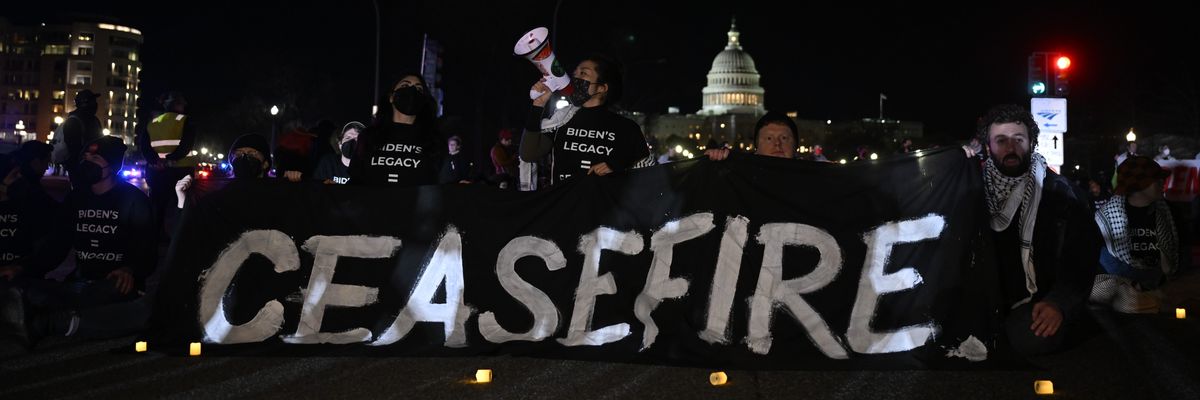How do we break the cycle of violence?
As a local healing arts facilitator, trauma survivor, and Jewish activist, this question never leaves my mind.
Long before I dreamed of joining a mass action to block President Joe Biden’s motorcade route to his State of the Union address—or of co-organizing the 25 Mile March for Palestine—I was committed to understanding collective trauma, healing, and liberation.
You see, I grew up poor, white, and Jewish. The formative experiences of my childhood, including food insecurity, sexual violence, and antisemitism, left me with an intimate awareness of the human capacity for violence. Though this was normalized within the fabric of my everyday life, I always felt that so much more was possible. Only after my escape would I go through the painful and transformative process of learning what it actually meant to be a survivor, what it meant to have a voice, and what it meant to be free.
I am calling for the safety and freedom of all people, and an end to sexual violence, through an immediate and permanent cease-fire, the release of all hostages, unhindered humanitarian aid to Gaza, and a cessation of U.S. weapons sales to Israel.
Through this process, I uncovered trauma histories of my family lineage. I also learned to see my identity beyond victimhood by connecting with others who had experienced different forms of oppression and violence. I began to trace the familiar shapes of our silencing. I began to track the impact of mainstream narratives, including the stark dichotomy between victim and perpetrator, and how the assumptions of absolute innocence and evil that accompany these terms dehumanize all parties. When experiences of victimization become core to an individual or group’s identity, there is grave danger of being unable to grasp one’s sense of agency or impact. Indeed, I began to realize, victims can become perpetrators.
Following the shocking attack on October 7, allegations abounded that Hamas systematically sexually abused and mutilated Israeli women. As a survivor who deeply believes and loves other survivors, I immediately grieved alongside all who had been violated. My commitment to Palestinian liberation could never exclude my grief for the Israeli civilians who had been targeted. Yet, as further evidence surfaced, my heart broke open yet again: It became apparent to me that survivor voices were not at the center.
For example, the seminal New York Times article published in late December entitled “Screams Without Words: How Hamas Weaponized Sexual Violence on October 7” was revealed to be wholly lacking in evidence for its sweeping claims. The United Nations has since released a special report clarifying that two of the most widespread allegations regarding sexual violence were groundless. The report also named that there were reasonable grounds to believe that incidents of sexual violence occurred on October 7. However, Israel has continued to disallow a full-fledged investigation by the U.N., while repeatedly using the specter of systematic sexual violence in Israeli and U.S. mainstream media to justify the genocide and ethnic cleansing of Palestinian men, women, and children.
Governments are so quick to act out of vengeance, but so slow to listen to the voices of survivors themselves. Many of us do everything within our power to find the truth beneath the rubble. Many of us plead that our society looks at the root causes of violence, ranging from intergenerational trauma to occupation, from racism to the pervasive denial of humanity. Many of us organize for systemic change and transformative justice practices that acknowledge the humanity of everyone who commits—and is impacted by—violence. Many of us break into pieces each time another child is killed before our eyes. Many of us scream: “Not in our name!” Many of us demand access to substantive healing resources for survivors everywhere, including the time to breathe and rest, and the support to tell our own stories.
While elected officials invest our tax dollars in deadly weapons, the actual demands and dreams of those who have been raped, traumatized, and brutalized by individual and communal acts of violence are forgotten. We know that the Israeli military has been documented sexually assaulting Palestinian civilians and prisoners throughout the occupied territories, even as such stories rarely make the
headlines. State violence creates the conditions for sexual violence, and the resulting wounds are felt for generations.
In healing my sense of agency as a survivor, I have learned to recognize my privilege and power, and to see that I too have the capacity to commit acts both of harm and of healing. As an American Jew, I am compelled to embrace the power of my own voice, and refuse complicity with collective violence. I am calling for the safety and freedom of all people, and an end to sexual violence, through an immediate and permanent cease-fire, the release of all hostages, unhindered humanitarian aid to Gaza, and a cessation of U.S. weapons sales to Israel. Anything less would be a denial of my own humanity.



